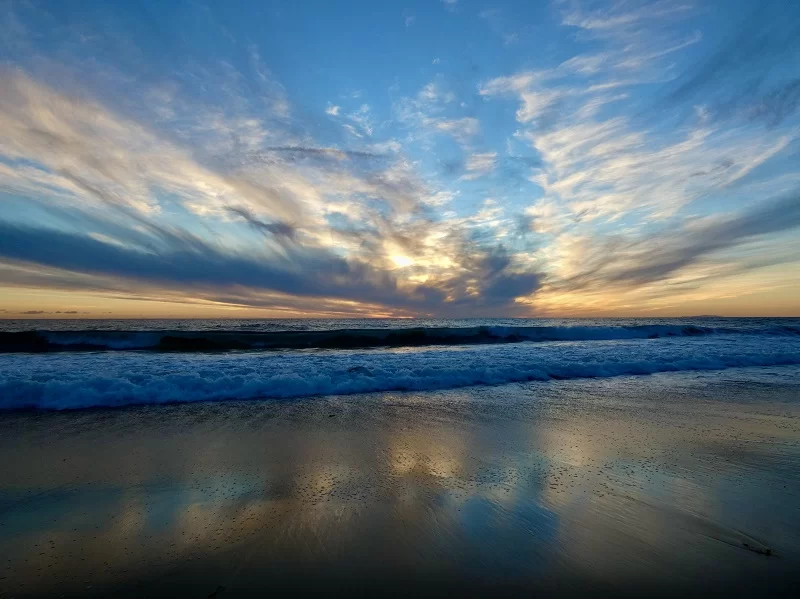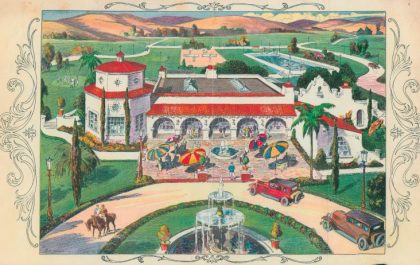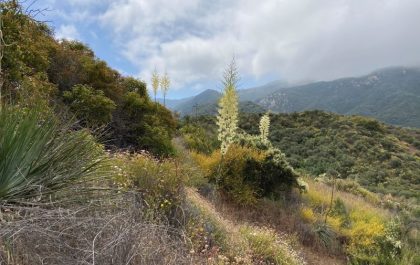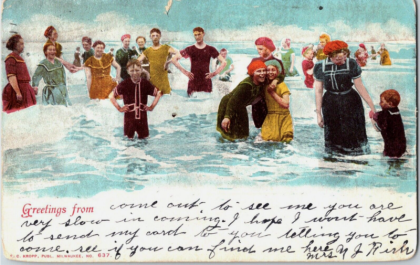
Did you know Lewis and Clark were bad at spelling? It’s true. They wrote in their journal that when they reached the Pacific they shouted ‘Ocian in view!’” I know just how they felt, spelling and all. I won’t ever forget my first sight of the Pacific Ocean. The line of blue in the distance somehow didn’t feel real, until suddenly it spread out below and away to the horizon.
The road that led down to the shore was called the California Incline, and it didn’t dawn on me for months that the name came from the street—California Avenue. Instead, it seemed like it was the slope where California fell away into the ocean, and there we were, driving along the beach. I could smell it, salty and sharp, and hear the waves even over the noise of the engine. I had the strangest feeling, as we turned west up the coast and left Los Angeles behind, that I was leaving not only my old life behind but also somehow my entire world.
Everything happened so fast that year. We all knew war was coming. You can’t live on a military base and not know. But the bombing at Pearl Harbor, and then the declaration of war, seemed far away, at least they did to me, until the telegram arrived.
We were eating breakfast. Alice, my sister, stopped chattering. For her, life had already changed. She was home for the holidays from college, but all her thoughts were still at her school and about a future far away from here. For me, the telegraph was like being on the Titanic and watching the iceberg getting closer and closer: I knew what was coming and that there was no way to stop it but I felt like the bottom had dropped out of my world.
Father had his most officer-like expression, blank and official, as he read it.
“Hawaii,” he said at last. “At the end of the month. At least we can have Christmas together. Alice, you’ll be fine at school, but we must find a place for Jim.”
My heart sank. Mother died when I was little. Alice remembers her, I do, too, but only a little bit. Alice is a lot older than me, seven whole years, so she sort of raised me after Mother died. It was always just us. Father is a Navy surgeon. That’s a fancy way of saying doctor. We moved around a lot when I was a kid. I didn’t mind, but when you live like that you never put down roots, and when change comes into your life like a big windstorm there’s nothing to anchor you.
We’d been living in Illinois for a couple of years now, and it seemed like maybe we would get to put down roots after all. I know the Navy doesn’t spring to mind when you think of Illinois, but this was Naval Station Great Lakes, where they do a lot of training and stuff. It’s huge, like a whole city. We have—had—a house of our own, a nice one. Father worked like a normal doctor. Long hours, but at least he was here. It was great. And then the telegram came, and that was all he could think about. I tried to be glad. He’s a great doctor and he will be saving lives—I know that’s really important—but I felt scared. What would happen to me?
Alice and I have just two relatives, other than father, who aren’t about a hundred years old. Our father’s first choice was our Great Aunt Charlotte. She looked after us a bit after Mother died, but she told him she didn’t think she could cope with a boy. It made it sound as if being a boy was some kind of disease.
That left our Aunt Madeleine. She’s our mother’s older sister. Ali and I never met her but we liked her because she always remembered our birthdays and sent really great Christmas presents. Aunt Charlotte sent handkerchiefs and socks. Aunt Madeleine sent books about ancient Egypt, or pirates, or King Arthur, and once even a real brass spyglass, but she was always the kind of aunt that father’s side of the family talked about in whispers if they talked about her at all.
Aunt Charlotte used to say that Aunt Madeleine was mad, “mad by name, mad by nature,” she said. But I guess in times of war even an odd aunt is better than no aunt at all.
Father wrote to her, and she wrote back right away to say I could come and stay with her, and Ali, too, for when she has vacations and things. She even sent a note addressed to me, telling me I was welcome and she looked forward to meeting me. That made me feel a little better. A lot better, really, but I would be going two thousand miles away from our Illinois home, to a little coastal town in California called Malibu. I’d never heard of it. I couldn’t even visualize it. And Father, he would be going even further, all the way to Hawaii. He would be going into danger.
Once everything was settled with Aunt Madeleine, things moved fast. The days slipped by, and everything was changing everywhere. New recruits began to pour into the base. The town was flooded by men in uniform. Just like us, other families were packing and leaving: officers to assignments, children and wives headed to other bases or scattered to relatives in other places.
We packed up the house. All the furniture and things would be put into storage when we were gone. The house seemed smaller without our things in it. I knew I would probably never see it again. Some other family would live here, but not us. I wondered if we would even ever be a family again.
Ali went back to her college after New Year’s Day. That part was awful. Ali’s not the crying kind of girl, but she cried at the train station. So did Father. So did I.
One minute she was hugging me, the next she was gone. At least I would have Father a little longer. We would be traveling together to Los Angeles. That made me feel a bit better, but not much. We left on a cold, dreary January day. My last glimpse of the house and the lake was gray and sad. But as our train pulled out of the station and gathered speed, I felt my heart lift. I thought about how I was going to California. Crossing the whole U.S. of A. like Lewis and Clark. It was going to be an adventure.
Father was quiet, even for him, during the journey. I was waiting for a lecture on how to behave, or something like that, but it never came. After a while, I realized it wasn’t his usual quietness. The closer we came to California the more I felt that difference. As if, under all of the calm and discipline he was scared and excited, too. Father can be sort of aloof, sometimes. Ali calls him an Olympian. She means he’s like the Greek god Zeus. In our book of Greek myths the drawing of Zeus even looks like Father—stern and in control. Knowing he felt the same way I did underneath made him seem more human.
Aunt Madeleine was on the platform in Union Station in Los Angeles to meet us when the train pulled in. She wore a respectable gray suit, a black felt hat, round, black-rimmed glasses, and sensible shoes. She looked every bit an aunt and not at all the kind of person people talk about in whispers. The only thing that stood out was a pin on her jacket lapel: it was an animal of some kind, its long, furry body looked like it was made of gold. It had silvery claws and fierce little eyes that glittered with crystals or maybe even diamonds in them.
She shook hands with Father, and then with me, then left us to say goodbye while she found a porter. Father had wanted to stay over for a day or two to make sure I was settled, he said, but he was needed in San Diego as soon as he could get there, so he had to catch the next train. My aunt waited while Father got onto his train, and for me to wave until the train was out of sight. She organized my bags and guided me out of the station with as much efficiency as a Navy Commander, without saying a word. I was glad. I didn’t want her to see I was crying. She knew anyway, and handed me a large clean handkerchief, still without a word.
“Do you prefer James or Jim?” she asked, when I could talk again.
“Anything except Jimmy,” I said, feelingly. “I hate that nickname. My Aunt Charlotte called me that. My mother always called me James,” I added.
“James it is, then,” she said. “My friends call me Maddie, so perhaps Aunt Maddie would work for you?”
I tried to smile. She was being kind. “Thanks, Aunt Maddie,” I mumbled.
We walked out of the train station into a blaze of afternoon sun and warmth. It was strange to stand here in the warmth and remember the snow on the ground back in Illinois. After seeing my aunt, I expected a taxi or a plain but sensible car of some kind, but she marched us up to a bright red and black convertible. It was a kind of car I’d never seen before. It looked fast, sleek, and exotic. Aunt Maddie saw me gawking and grinned at me.
“It’s a 1936 Bugatti Stelvio,” my aunt said. “Her name is Ponselle.”
“What does Ponselle mean? I asked. I’d never known anyone who named their car.
“Rosa Ponselle is an opera singer, one with a powerful voice,” my aunt said.
The car also had a powerful voice. The engine purred, rumbled, and whined its way down the crowded street. On and on we drove, until finally, there was the ocean, but Malibu was a long way from town. We drove west, into the sun for miles. First with wide beaches on our left, and then rocky shore with the sea just below the road.
“Have you ever seen the Pacific before?” my aunt asked. When I shook my head, she turned the car and stopped by the side of the road. “Out you get. Everyone who plans to stay must be properly introduced to their most important neighbor,” she said.
We ducked under a rusty barbed wire fence, and scrambled down the embankment onto the sand. With the powerful voice of Ponselle silenced I could hear the rush of the surf, and the rumble of cobblestones, tumbled by each wave. My dignified aunt pulled off her shoes and stockings and waded in, laughing at my shocked expression.
“Come along, don’t be shy,” she said.
I took off my shoes, rolled up my trousers, and felt the cold Pacific ocean wrap around my ankles. It smelled of salt and iodine. “It’s January,” I thought to myself. “And I’m standing in the ocean.”
Aunt Maddie gave a cry and fished something out of the water.
“It’s an abalone shell,” she said. “For you. For luck.” She handed me an oval shell, its rainbow hue matching the pinks and greens of the sunset sky.
She didn’t look like my mother, even though they were sisters, but right then she reminded me of her so much I almost cried again. Maybe everything would be alright after all.












A wonderful story. I can’t wait for chapter three. Reminds me of things I read under the covers past bedtime with me flashlight. Many many years ago.
Thank you so much, Randy! Writing the Coastwatchers has been a dream come true for me—I too spent a lot of time reading those types of books by flashlight as a child!